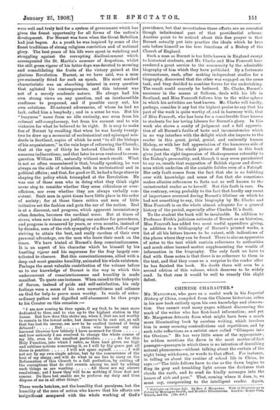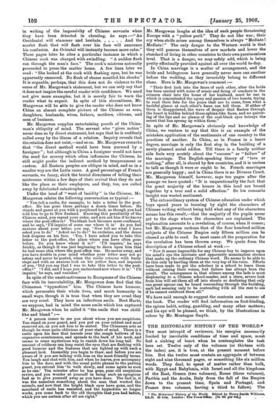CHINESE CHARACTER.*
Mn. MACGOWAN, who gave us a useful work in his Imperial History of China, compiled from the Chinese historians, relies in his new book entirely upon his own knowledge and observa- tion. One cannot read many pages without discovering the mark of the writer who has first-band information; and yet Mr. Macgowan detracts from what might have been a much more illuminating book by careless writing, which involves him in many seeming contradictions and repetitions, and by such trite reflections as a satirist once called "Glimpses into the Obvious." He has very little sense of the appropriate ; he seldom mentions the dawn in the most matter-of-fact passages—passages in which there is no intention of describing natural phenomena—without talking about the curtain of the night being withdrawn, or words to that effect. For instance, in telling us about the routine of school life in China, he says :—" The little fellows have to rise as the dawn begins to fling its grey and trembling light across the darkness that clouds the earth, and to send its kindly messages into the homes of rich and poor." That; coining where it does, is, we must say, exasperating to the intelligent reader. Again, gills on Cuheinrm Life. By v. yth• and 34 otheIr. glaucegoortiiin. .Withuld2euilluEsetratuioinua in in writing of the .impassivity of Chinese servants when they have been detected in clie,ating, he says :—" An
Occidental will stammer and hesitate And the scarlet flush that will flash over his face will announce his confusion. An Oriental will instantly become more calm."
Three pages later he cites a particular instance in which a Chinese cook was charged with swindling. "A sudden flush ran through the man's face." The cook's mistress naturally proceeded to press the matter home. A few lines later we read : "She looked at the cook with flashing eyes, but be was apparently unmoved. No flush of shame mantled his cheeks." It is arguable, perhaps, that this does not do violence to the sense of Mr. Macgowan's statement, but we can only say that it does not inspire the careful reader with confidence. We need not give more examples, but it is merely fair to warn the reader what to expect. In spite of this slovenliness, Mr. Macgowan will be able to give the reader who does not know China an almost complete picture of the Chinese as sons, daughters, husbands, wives, fathers, mothers, citizens, and men of business.
Mr. Macgowan supplies entertaining proofs of the China.
man's obliquity of mind. The servant who "gives notice" never does so by direct statement, but says that he is suddenly called away by the illness of a relation. Inquiry reveals that the relation does not exist,—and soon. Mr. Macgowan remarks that "the direct method would have been pursued by a foreigner"; but although in China a foreigner would not have the need for secrecy which often influences the Chinese, he still might prefer the indirect method by temperament or custom. All Eastern peoples are oblique in mind, and so in a smaller way are the Latin races. A good percentage of French servants, we fancy, shirk the brutal directness of telling their mistresses within a few days of their arrival that they do not like the place or their employers, and they, too, are called away by fabricated catastrophes.
Under the head of "want of lucidity" in the Chinese, Mr.
Macgowan relates the following conversation as typical :—
" You tell a coolie, for example, to take a letter to the post- office. He has gone there perhaps a dozen times before. He stands and gazes at you with a perplexed look, as though you had told him to go to New Zealand. Knowing this peculiarity of the Chinese mind, you repeat your order, and you ask him if he knows where the post-office is? The blank look becomes more confirmed, and he says inquire of some one where it is.' As you feel anxious about your letter, you say, 'Now tell me what I have asked you to do." Asked me to do?' he exclaims, and the dense look deepens on his face. 'Yes, I have asked you to take this letter to the post-office, the place where you have often gone before. Do you know where it is ? "I'll inquire,' he says briskly, as though it was just beginning to dawn upon him that he bad some idea where the post-office was. He moves away, and you have doubts in your mind whether your letter may not go astray and never be posted, when the coolie returns with hasty steps and with an anxious look on his yellow face, and inquires of you, 'Did you say that I was to take this letter to the post- office ? " I did, and I hope you understand now where it is." I'll inquire,' he says, and vanishes."
In spite of the unattractiveness to Europeans of the Chinese face with its inscrutability, Mr. Macgowan does find that the Chinaman " hypnotizes " him. The Chinese have humour, which permeates their whole lives, and much humanity in small ways, though it is true that when they are cruel they are very cruel. They have an infectious smile. Bret Harts, we suppose, had in mind the same smile which has captured Mr. Macgowan when he called it "the smile that was child- like and bland" :--
"A person comes to see you about whom you are suspicious. You stand on your guard, and you put on your coldest and most reserved air, as you ask him to be seated. The Chinaman acts as though he were quite oblivious of your state of mind. There is a smile upon his face that travels over the rough hollows of his expansive countenance, and spreads to the back of his neck, and seems in some mysterious way to vanish down his long tail. No amount of coldness can long resist the eyes that are flashing with good humour and the features that are lighted up with such a pleasant look. Insensibly you begin to thaw, and before you are aware of it you are talking with him on the most friendly terms. You laugh and chat with him, and when he leaves, you accompany him to the door, and with the usual polite phrase to the parting guest, you entreat him to walk slowly, and come again as soon as he can.' Ten minutes after he has gone, your old suspicions revive, and you wonder at yourself in being such an egregious fool as to give yourself away as you have done. The fact is, it was the nameless something about the man that worked the miracle, and now that the bright black eyes have gone, and the moorland of smile has vanished, and the hypnotism no longer works, you come back to the old thoughts that you had before, which you are certain after all are right." Mr. Macgowan laughs at the idea of such people threatening Europe with a "yellow peril." They do not like war; their cry when strife arises among themselves is always " Mediate ! Mediate!" The only danger to the Western world is that they will possess themselves of new markets and lower the
standard of living in other countries to their own parsimonious level. That is a danger, we may safely add, which is being pretty effectually provided against all over the world to-day.
In China marriage is a matter of arrangement, and the bride and bridegroom have generally never seen one another before the wedding, as they invariably belong to different clans. Here is Mr. Macgowan's comment :—
"Their first look into the faces of each other, after the bride has been carried with noise of music and firing of crackers in the crimson chair into the home of her husband, must be one in which is concentrated the agony and passion of two hearts, trying to read their fate for the years that are to come, from what a bashful glance at each other's faces can tell them. If either of them is disappointed, the wave of despair that flashes through the heart is hidden behind those sphinx-like faces, and no quiver- ing of the lips and no glance of the coal-black eyes betrays the secret that has sprung up within them."
In spite of Mr. Macgowan's obviously real knowledge of China, we venture to say that this is an example of the mistaken application of the sentiments of one country to the practices of another. In China, as in France in a lesser degree, marriage is only the first step in the building of a newly planned social edifice. Till there is a family neither
side feels very acutely about the " success " or " failure " of the marriage. The English-speaking theory of "love Or nothing," after all, is shared by few countries, and it is useless to talk as though it were or ought to be. French marriages are generally happy ; and in China there is no Divorce Court. Mr. Macgowan himself, however, says ten pages after the passage we have quoted : "It is unquestionably the fact that the great majority of the homes in this land are bouad together by a true and a solid affection." So' his romantic insight was wasted sentiment.
The extraordinary system of Chinese education under which boys spend years in learning by sight the characters of Chinese writing without being told what any of the characters means has this result,—that the majority of the pupils never get to the stage where the characters are explained. The
explanation amounts to a revelation, of course, when it comes; but Mr. Macgowan reckons that of the four hundred million subjects of the Chinese Empire only fifteen million can he• classed as able to read. In most cases all the preparation for the revelation has been thrown away. We quote from the
description of a Chinese school at work :—
" Now it seems impossible for any Chinese boy to impress upon his mind's eye the intricate and apparently meaningless strokes that make up the ordinary Chinese word. He seems to be able to do this only by bawling them at the very top of his voice. Efforts have been made to get the scholars in a school to learn them without raising their voices, but failure has always been the result. The consequence is, that silence among the lads is most displeasing to a Chinese school-master, and a stern, severe look from him will set them all off into shouts so deafening that only one great uproar can be heard resounding through the building, each lad seeming only to be contending with all the rest to see if he cannot outshout them all."
We have said enough to suggest the contents and manner of the book. The reader will find information on foot-binding,
the opium habit, acting, gambling, and many other matters ; and his eye' will be pleased, we think, by the illustrations in colour by Mr. Montague Smyth.





















































 Previous page
Previous page